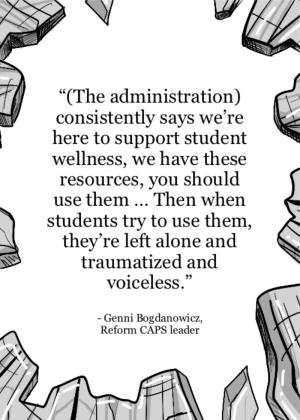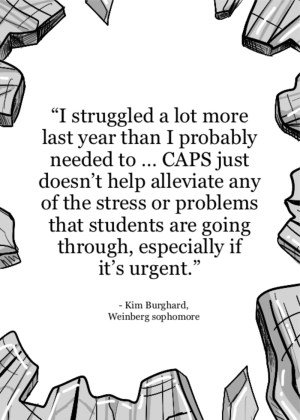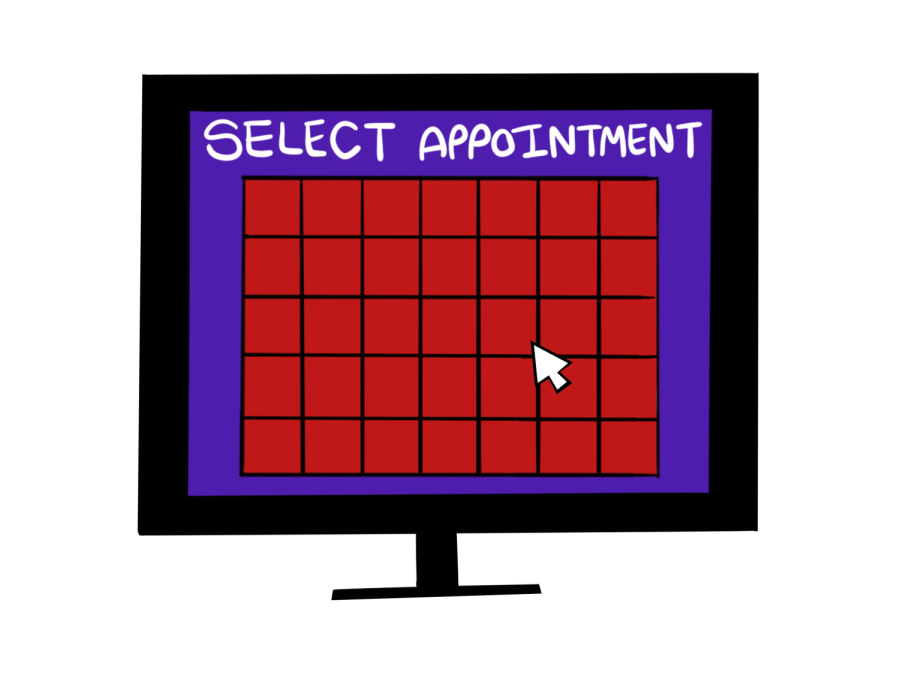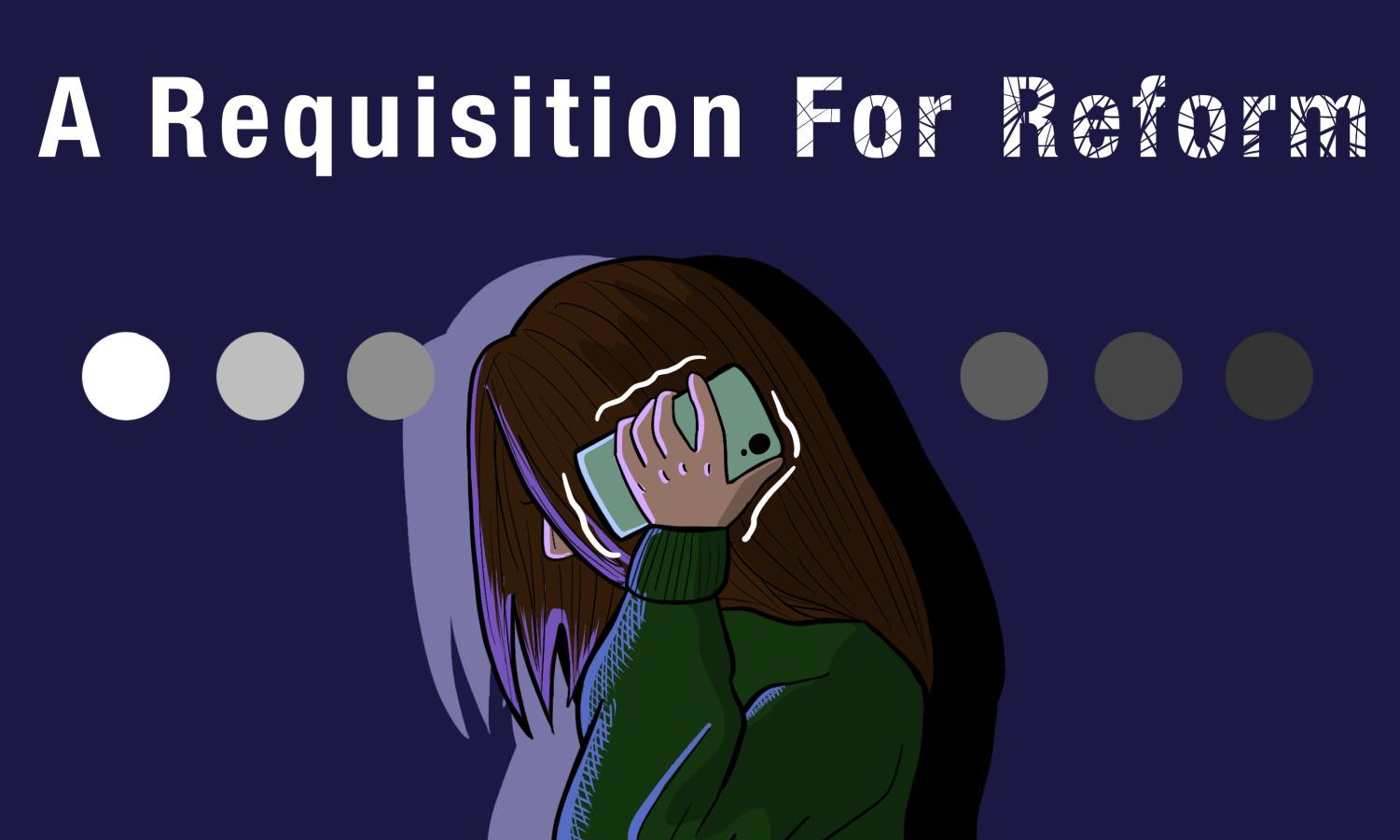In Focus: Northwestern students call for overhaul of campus mental health services amid national wave of collegiate advocacy
February 4, 2022
Content warning: This story contains mentions of eating disorders, suicidal ideation, self-harm, depression, anxiety and bipolar disorder.
Three weeks into his freshman year at Northwestern, Sahibzada Mayed was involuntarily escorted to the hospital by University Police.
Mayed had moved from Pakistan only a month earlier. After learning he was one booster shot short of the Illinois vaccination requirement, he sought an exemption due to his lifelong phobia of needles and injections. As part of that process, Mayed was required to meet multiple times with Counseling and Psychological Services to provide proper documentation of his phobia for what was then called Northwestern University Health Service.
During his sessions with CAPS, Mayed’s counselor expressed concern that he may have an eating disorder based on his appearance. Mayed explained he was instead struggling with long-term gastrointestinal issues.
“When people have eating disorders, sometimes they don’t want to seek help, but they really need it,” he said. “I understand that perspective, but the only problem was (CAPS) ignoring the medical history.”
Mayed’s counselor shared their concern with NUHS, which prompted a doctor to order blood work. That required Mayed to face the very phobia that caused him to reach out to Health Services and CAPS in the first place.
When one of his tests came back showing high levels of sodium, NUHS ordered additional blood work. The night before this appointment, NUHS told Mayed it needed to reschedule. He decided to wait until morning to respond so he could coordinate with his adviser, who accompanied him during the first round of blood work for support.
The next morning, an assistant dean of students sent Mayed an email explaining they had received “concerning information” about him. If he did not go to the Dean of Students Office, the assistant dean would call his parents or UP, the email said.
“This was my third week of Fall Quarter freshman year,” Mayed said. “Can you just imagine reading that email?”
Mayed and his adviser met the dean of students, who took them to Searle Hall — which housed NUHS and CAPS — to meet Mayed’s doctor and therapist. His therapist told him he was unable to take care of himself and posed a danger to himself and others.
That was when UP arrived. The officers admitted him to Evanston Hospital for self-harm or harm to others under involuntary commitment.
Mayed was discharged two and a half hours later. He said the emergency room doctor said they were unsure why he was admitted, and referred him to a gastroenterologist, a specialist in disorders of the digestive system.
The gastroenterologist confirmed what Mayed said all along: he did not have an eating disorder. But even after this assessment, he said all of the referrals and treatment plans CAPS suggested were for outpatient eating disorder programs.
“The problem was I never got the help that I needed,” Mayed said.
University spokesperson Jon Yates told The Daily in February that NU does not comment on individual students’ cases, but he said the University has worked since 2019 to change its emergency response policies to prioritize non-police intervention and reduce instances of hospital transit.
Two years later, Mayed, now a McCormick junior, is one of the leaders of Reform CAPS, a student activist organization founded in May 2021 advocating for an overhaul of NU’s student mental health services. The group’s demands include increased transparency of policies, accountability for mishandled cases, reduced wait times and a larger counseling staff.
The organization has advocated for these reforms by painting The Rock, hosting student forums and meeting with administrators. Reform CAPS has also published more than 25 mostly anonymous negative student experiences with CAPS through its Instagram account in addition to other resources to support mental health.
“A major goal of the movement as we started was to provide an outlet to students that have had experiences with CAPS that were not heard,” Mayed said.
Reform CAPS launches after years of student concerns
Reform CAPS is not the first to highlight these issues with NU’s mental health services.
In 2013, students reported long wait times for appointments and a shortage of counselors. In 2016, CAPS removed its 12-session limit, but students said its services still relied disproportionately on outside referrals.
During the COVID-19 pandemic, SESP Prof. Emma Adam, a developmental psychologist, said uncertainty about the future has particularly impacted young adults — from job hunting to bouncing between remote and in-person classes.
“Young adults are more likely to be living alone or in small household sizes,” Adam said. “Because of the pandemic restrictions, they can’t see friends and connect.”
Up to 50% of young adults reported experiencing clinical levels of depression and anxiety at certain points in the pandemic, Adam said. In a 2020 survey conducted by the American Psychological Association, eight in 10 young adults said they could have used more support for their mental health.
While the pandemic has exacerbated mental health issues among students, Adam said this is not new — youth depression and anxiety have been rising since the early 2010s.
University President Morton Schapiro told The Daily in November 2021 that administrators have worked to expand CAPS for several years. Garrett Gilmer, executive director of CAPS, also told The Daily in January the office has received “considerable funding” in the past five years to increase staff and services.
“Every time they came to me and said, ‘Can I have more funding to hire more people?’ I’ve said yes,” Schapiro said in November. “And this wasn’t just last year (or the) year before. It was the whole time.”

Despite increases in funding, students have said mental health services are still lacking. Since October, Reform CAPS leaders have met weekly with Assistant Vice President of Wellness and Dean of Students Mona Dugo and CAPS leadership to discuss their demands.
Though CAPS leadership has committed to working with the organization, Reform CAPS leaders said the administration has yet to make substantive changes.
“(The administration) consistently says we’re here to support student wellness, we have these resources, you should use them,” Reform CAPS leader and SESP sophomore Genni Bogdanowicz said. “Then when students try to use them, they’re left alone and traumatized and voiceless.”
Inconsistent wait times create barriers
For students hoping to access resources from CAPS, Bogdanowicz said wait times are one of the first — and largest — obstacles in seeking care.
To access CAPS therapy, students must start with a care plan meeting. Students could previously see and book available appointments online months in advance. But CAPS altered its process so students can now only make these initial appointments two weeks in advance.
Yates said in November 2021 CAPS made this change because students frequently skip or cancel appointments scheduled more than 14 days out. Students looking for urgent help can refer to same-day access services, he said.
Schapiro told The Daily in November 2021 the average wait time for a non-emergency appointment is three days. However, according to the CAPS website, students can expect to wait a week for a care plan meeting and another week to meet with an ongoing therapist “except during busy times of the year.”
In contrast, Brown University, Johns Hopkins University and Washington University in St. Louis all say the average wait times for their counseling services are less than a week.
When Weinberg sophomore Kim Burghard consulted CAPS for an attention deficit hyperactivity disorder diagnosis in May 2021, they said there were no appointments listed for the rest of the month.
“It was urgent since I needed a diagnosis to get accommodations and medication,” Burghard said. “I was really struggling during midterms week, and … it’s like putting my entire academic stuff on hold while I’m trying to get an appointment.”
After finally booking an appointment, Burghard had to rearrange their schedule to attend because of limited slot availability. Burghard said CAPS sent them three therapist referrals the next day — none of whom took their insurance.

Burghard ultimately decided to wait until summer when they returned home to get an ADHD diagnosis, which meant they were unable to get accommodations or medication for the remainder of the academic year.
“I struggled a lot more last year than I probably needed to,” Burghard said. “CAPS just doesn’t help alleviate any of the stress or problems that students are going through, especially if it’s urgent.”
Students report inadequate emergency support
CAPS launched same-day services last quarter, and Gilmer said 293 students have accessed them as of Jan. 18. Though the administration has cited same-day appointments as an emergency resource to The Daily, students have also reported long wait times for these services — including the CAPS crisis hotline.
Two students, who will remain anonymous due to privacy concerns, said they called the hotline early Fall Quarter after a friend confided in them about experiencing suicidal ideations and self-harm.
A CAPS staff member told them a counselor wouldn’t be available for at least an hour and a half since the two therapists on call were in a meeting, the students said.
“I did not feel there was any sort of urgency whatsoever,” one of the students said.
After calling a second time and rearticulating their concern for their friend’s immediate safety, a CAPS representative still said the students would need to wait, they said. It wasn’t until they called an on-call number listed for the Dean of Students Office and a staff member called CAPS directly that a representative followed up.
When the students and their friend got to Searle, they said the counselors on call said they were not seeing students in-person, and all they could do was call 911.
“They were like, ‘Do you need a blanket? Do you need water?’” one of the students said. “I was like, ‘I need you to help me because I am a child, and I don’t know how to take care of someone who’s having a panic attack. I haven’t been trained for this.’”
The CAPS counselors said they would call the paramedics, the students said. But after several conversations with the students’ friend, the counselors still hadn’t placed the call.

A third counselor arrived and spoke with the student to gauge their condition, the students said, and the paramedics were finally called. According to their phone and text logs, about seven hours passed between when one of the students placed the initial call to CAPS and when they left Searle after the paramedics had arrived, they said.
Gilmer told The Daily in January CAPS can accommodate most requests for same-day virtual appointments when a student calls the hotline, but the “brief wait times” can range from 30 to 90 minutes. Yates told The Daily in November that students who contact the hotline should expect to receive a follow-up from CAPS the next business day.
While the two students who called the hotline were directly informed of this policy, they said they have not received any further communication from CAPS since.
Leaders of Reform CAPS said they have also heard several inconsistent stories from students who have called the hotline. Bogdanowicz said these experiences reflect how difficult it is for students to navigate the office’s services.
“A lot of their policies are unclear,” Bogdanowicz said. “Students are unable to know what may happen if they call the crisis line in terms of confidentiality, wellness checks, anything like that.”
CAPS diagnoses conflict with outside professionals’
Like Mayed, other students have reported negative experiences receiving a formal diagnosis from CAPS.
A Weinberg sophomore and international student, who asked to remain anonymous for privacy concerns, said they received a diagnosis from CAPS that felt rushed and inaccurate. After moving to campus in fall 2020, they began meeting concurrently with a counselor and psychiatrist, both from CAPS.
The sophomore said their psychiatrist diagnosed them with bipolar disorder after a single session lasting about two hours.
Bipolar disorder is characterized by intense mood episodes that can last for several days or weeks. To diagnose the disorder, a doctor may perform a physical exam, conduct an interview or ask the patient to keep a regular chart of their moods, according to the Mayo Clinic.
After the diagnosis, the student began meeting with their CAPS counselor weekly and their psychiatrist every two weeks. While these sessions were helpful, they said both the counselor and psychiatrist “insisted” they start taking medication.

They began taking Lamictal and Wellbutrin that fall — medications which can spur negative side effects.
The student said they began experiencing rashes, a known side effect of Lamictal, as well as increased anxiety. However, under the CAPS short-term therapy model, the student’s sessions were scheduled to end in winter 2021.
“You cannot leave a person who’s on medication like Lamictal and (Wellbutrin) alone,” the student said. “When you take a mood medication … and you drop it cold turkey, you get psychological distress.”
Realizing the negative side effects of the medication, the student called the CAPS hotline several times for a consultation about their persistent anxiety. They said the guidance from the hotline representative was “very condescending.”
“I remember calling the emergency line so many times telling them, ‘Hey, I have a rash … I’m completely alone, I’m having a panic attack, I need help,’ and they were just telling me, ‘What do you want us to do?’” they said. “I didn’t have a psychiatrist to talk to (anymore), so I felt like they just left me there.”
The CAPS representative advised them to check into the emergency room, but the student said they worried an ER visit could incur a high medical bill.
To connect with another ongoing psychiatrist, CAPS told the student they would have to undergo the diagnosis process again, which the student said felt unfeasible in the middle of Finals Week.
The student said they continued experiencing withdrawal symptoms, anxiety and depressive episodes throughout the summer. Last quarter, they connected with a psychiatric center in Chicago that gave them a separate, non-bipolar diagnosis after a longer screening process with multiple specialists.
Gilmer told The Daily in January CAPS clinicians work directly with students to assess symptoms and evaluate their history and then determine a treatment or referral.
“Depending on the presenting concerns, assessment may include psychometric testing (by an outside provider), review of previous treatment records, consultations with close family or friends (only when authorized by the student) and conversations with the student,” Gilmer wrote in the January email.

The student added they did meet with a CAPS counselor twice this fall in virtual, same-day sessions. These sessions were far more helpful because the counselor specialized in anxiety, they said.
“You might get a decent person if you call and you’re having a crisis on the right time on the right day,” they said. “But most of the crises don’t happen on the right time and on the right day.”
A lack of diversity leaves students isolated
Reform CAPS has also advocated for a more diverse range of counselors to address the myriad experiences of students.
Almost everyone Mayed met at CAPS during his freshman year was white, he said, which forced him to endure “racist, stereotypical” comments about health care in South Asian countries. Rather than acknowledging the cultural context of his health concerns, the employees he encountered imposed their own assumptions about his health, he said.
“The sole thing that they were going off of was appearance, BMI,” Mayed said. “It’s a very known fact that (people of) Asian backgrounds or BIPOC might have different ideals than your normative, white-centric BMIs.”
Gilmer said CAPS does not publicize the demographic breakdown of its team because it qualifies as personal information. Specific demographic categories also do not fully encompass all “identity-based information,” he said, and the office is committed to assembling a diverse staff trained in cultural humility.
Because of the short-term therapy model CAPS employs, the service refers most students seeking long-term, specialized therapy to outside providers. However, options for diverse providers are limited in the referral database.
Students can apply search filters like racial identity, religion, sexual orientation and specialty on the website. As of Feb. 3, the database has 153 options for Caucasian professionals, compared to 26 Asian and Asian American specialists, 13 Black, nine Latinx, nine multiracial or biracial, one Middle Eastern and North African, and zero Native American.
The Weinberg sophomore used a CAPS referral to book a therapist, but said the white psychiatrist trivialized their experiences as a BIPOC student.
“If you’re a (person of color) who is trying to look for someone who you can empathize with, who you can feel comfortable with — which is the purpose of therapy — it’s even harder,” they said.
Students call for increased transparency, accountability
CAPS last published an annual report in the 2017-18 academic year, which included common concerns, student demographic data, the number of quarterly visits to CAPS and results from a satisfaction survey.
These reports have since paused because CAPS and the Division of Student Affairs both underwent changes in leadership from 2018 to February 2021, Gilmer said.
While Gilmer said the reports will resume for the 2021-22 academic year, Reform CAPS has called for further transparency in the office’s policies and procedures. These details should be readily available on its website, Reform CAPS leader and Communication junior Catherine Z. said.
“A lot of our demands are just based on questions that we have that aren’t answered anywhere in the CAPS platform,” Catherine Z. said. “What happens when I call the crisis line? … How do I schedule an appointment? Who will be deployed in a crisis situation?”
CAPS does not currently provide a place on its website for feedback or questions. Yates told The Daily in November the best way for students to submit feedback regarding CAPS is to directly contact Gilmer. As of November, the office was developing an electronic feedback portal in accordance with student demands, he added.

After his experience with CAPS, Mayed said he wanted a copy of his counselor records for personal review. The clinical director at the time told him to receive the records, Mayed needed to contact his counselor, which he said forced him to speak with “the same person who’s caused the harm.”
“There’s no accountability structure at all,” Mayed said. “Current leadership has been working hard to just be like, ‘We’re available if you want to talk,’ but that’s not sufficient … If CAPS causes harm, I’m not going to go back to CAPS.”
A changing future for collegiate mental health
Even before the pandemic, university mental health services across the country struggled to meet community needs — and students have advocated for better support.
According to a 2021 report by the Center for Collegiate Mental Health, college counseling centers nationally have reported a surge in demand over the past two decades. Mental health advocacy movements have gained traction at NU’s peer institutions.
Brown University had similar issues with its counseling services but has overhauled its system in the past two years after listening to student demands. Reform CAPS leaders said they are using Brown as an example in their meetings with administration for how NU can implement reforms.
Feinberg Prof. Neil Jordan, who researches mental health services, said while there is rising demand for counseling services, a drastic increase in the number of people experiencing mental health struggles is likely not the chief cause.
“People are more comfortable identifying themselves as having mental health disorders and systems of care for treatment have evolved because (of it),” Jordan said. “We still don’t have enough community mental health services to meet the needs of all Americans, so (it’s) really important for universities and colleges to recognize this to grow their capacity.”
To address student demands, CAPS plans to better solicit student feedback, hire more staff of diverse backgrounds and increase its services, Yates said. NU is “not immune” to increased pressure on mental health services worldwide, he added.
Mayed said he is only “cautiously optimistic” about the University following through with these reforms because of its past responses to student activist groups.
“Obviously, it’s not great PR in terms of students sharing their experiences,” Mayed said. “To what extent are we actually seeing change, or to what extent is it just dealing with a situation at hand to calm it down?”
If you are in crisis, please call the National Suicide Prevention Lifeline at 1-800-273-TALK (8255), or contact the Crisis Text Line by texting TALK to 741741.
Email: [email protected]
Twitter: @CarolineLBrew
Email: [email protected]
Twitter: @maiapandey

